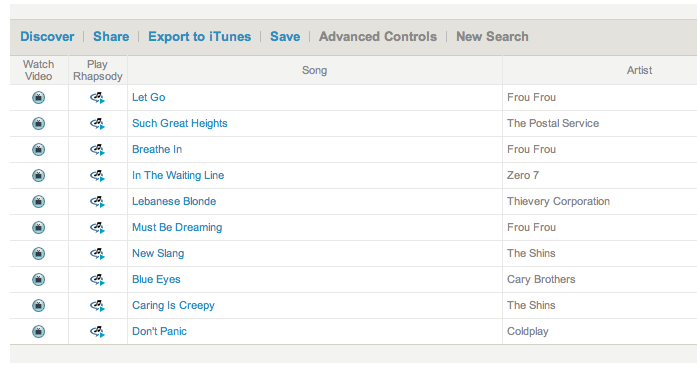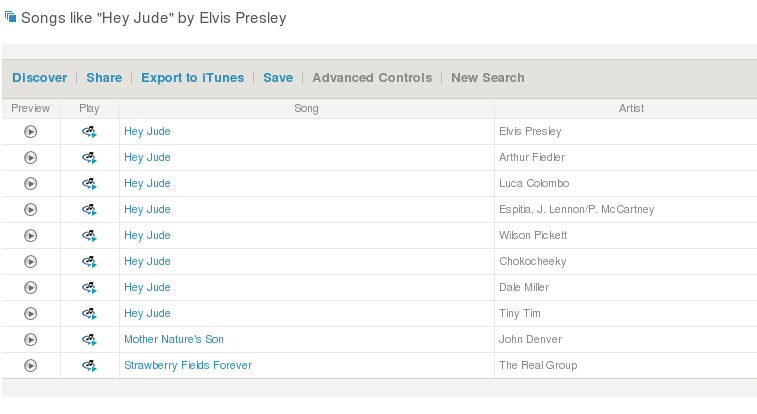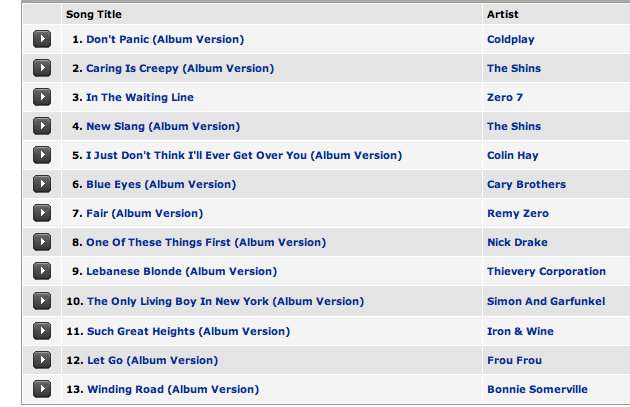Freakomendations - One LLama
 One
Llama is a music recommender that uses "acoustic analysis, cultural
analysis and collaborative filtering tools for music navigation,
discovery and search. On their website they say One Llama uses a
combination of Collaborative Filtering and Audio Similarity modeling to
generate recommendations. Our model harvests cultural references and
social networking data about each track, and listens to the audio using
an advanced "virtual ear." The result is a stronger combined logic for
all our recommendations. The One Llama method has the advantage of being
able to give intelligent recommendations for new audio tracks
immediately while becoming increasingly smarter as additional
information is collected about the tracks from playlists, downloads,
user feedback, etc.
One
Llama is a music recommender that uses "acoustic analysis, cultural
analysis and collaborative filtering tools for music navigation,
discovery and search. On their website they say One Llama uses a
combination of Collaborative Filtering and Audio Similarity modeling to
generate recommendations. Our model harvests cultural references and
social networking data about each track, and listens to the audio using
an advanced "virtual ear." The result is a stronger combined logic for
all our recommendations. The One Llama method has the advantage of being
able to give intelligent recommendations for new audio tracks
immediately while becoming increasingly smarter as additional
information is collected about the tracks from playlists, downloads,
user feedback, etc.
So with all that advanced mojo, one would expect some pretty good recommendations. Here's a recommendation based on the seed song 'Hey Jude' (I chose the Elvis version because they didn't seem to have the Beatles version in their catalog).
There's no doubt that these songs are "like 'Hey Jude'", but somehow the recommendation lacks subtlety and novelty of a real recommendation. Clearly the songs are not acoustically similar (Arthur Fielder vs. Tiny Tim?), and I can't imagine any set of users that would be listening to this set of song, so this is not being driven by a collaborative filtering algorithm. It seems that, at least for this recommendation, the primary driving force is metadata similarity. It is almost as if they just grabbed the Musicbrainz track data, tossed it all into a text similarity engine and turned the crank to get these similarities.
Zac points out another case where One Llama seems to be relying mostly
on metadata. Here's a playlist that One LLama generates for songs
similar to "Let Go" by Frou Frou. The set seems mostly reasonable from
an acoustic point of view - the playlist could have been constructed by
an expert - and in fact it was. The songs (with one exception) can all
be found on the Garden State soundtrack.

This is probably what one could expect from a collaborative filtering system. Lots of music listeners have bought the soundtrack. Any good CF algorithm will notice this and tie the items together. However, I don't think that is what is going on here. Looking at the One LLama playlist, there is one song that is not on the Garden State album. One Llama has added The Postal Service's 'Such Great Heights' to the playlist, while the Garden State has the cover of 'Such Great Heights' by Iron & Wine - although this is a cover, they sound very different; one is electronic-noise-pop, while the other is strictly acoustic. I suspect that, as with the Hey Jude example, One Llama is relying mostly on metadata similarity to determine similarity
Here's the track list for the Garden State:
Using metadata to generate track similarity is not inherently bad. It makes sense to use what works best. A young recommender company like One Llama doesn't have the deep user data necessary to generate good CF recommendations. Creating recommendations based on automatic acoustic analysis is really hard, acoustic-based recommendations are frequently prone to making mistakes that no human would make. I suspect that One Llama has adjusted the dials on their recommender to give more weight to the metadata until they get more user data and their automated analysis is up to par.

